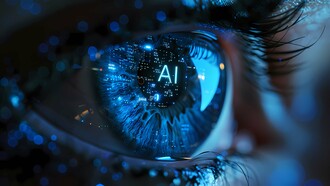Artificial intelligence (AI) constitutes an expeditiously burgeoning field that has imparted an ineffaceable imprimatur upon virtually every industry. The utilizations of AI are vast and heterogeneous, which encompass everything from healthcare to finance, transportation, and pedagogy. As AI persists in its progression, comprehending its implications and how it can be harnessed for the amelioration of society is of the utmost importance. In this essay, we will delve into AI's applications and potential Implications.
Applications of AI
AI has gained immense popularity in recent years owing to its capacity to automate tasks that would generally necessitate human intervention. One of the most promising AI applications lies within the healthcare sector. AI technologies like machine learning algorithms have been devised to assist in diagnosing diseases and offering personalized treatment suggestions based on a patient's medical history and lifestyle choices. This holds the potential to significantly enhance patient outcomes by shortening the diagnostic timeline and providing more bespoke treatments.
Beyond disease diagnosis, AI-empowered tools can also be employed to analyze vast quantities of medical data to discern trends and patterns that might not be readily observable to humans. For instance, Google's DeepMind Health has created an AI system capable of detecting early indicators of kidney damage by scrutinizing blood test results. Another AI-driven tool, Viz.ai, can automatically identify signs of stroke in medical imaging scans, enabling doctors to act swiftly and potentially save lives.
Finance is another sector where AI is being implemented. Financial institutions can utilize AI-driven tools to identify fraud, forecast market tendencies, and manage risk. This has the potential to substantially diminish financial losses and boost profits, benefiting both financial institutions and their clientele.
One manifestation of AI in finance is the advent of robo-advisors. These digital platforms employ AI algorithms to dispense investment advice and manage portfolios. Robo-advisors are often more affordable than traditional financial advisors and can provide more customized guidance based on a client's financial objectives and risk tolerance.
The transportation industry is also delving into AI's potential for enhancing safety and efficiency. Autonomous vehicles are becoming increasingly prevalent, with companies like Tesla and Waymo which spearhead this technological development. AI's incorporation in transportation also can alleviate traffic congestion and emissions, and pave the way for a cleaner and more sustainable future.
In addition to autonomous vehicles, AI-driven tools can optimize traffic flow. Pittsburgh, for example, has implemented an AI system that uses data from cameras and sensors to adjust traffic signals in real-time, which reduce congestion and improving travel times.
Autonomous vehicle technology holds promise to transform road travel. By removing human drivers, self-driving cars could potentially decrease accidents caused by human error. Fleet learning could also allow vehicles to adapt to traffic conditions for optimal efficiency. Over time, the growth of autonomous taxi fleets may reduce the need for individual car ownership.
The education sector is also experiencing the transformative impact of AI. Educational institutions are increasingly adopting AI-driven tools to personalize learning experiences for students by delivering tailored content and feedback based on individual needs and abilities. Such bespoke educational approaches have the potential to improve student outcomes and foster academic success.
AI-driven education encompasses the use of chatbots and digital assistants, which can support students in a variety of tasks, such as answering queries about course material or providing emotional support. These AI-powered tools can offer round-the-clock assistance, alleviating the workload on educators and ensuring that students have access to help whenever necessary.
Implications of AI
Recent advances in artificial intelligence technology have generated immense potential for positive impact across many domains. However, with all transformative innovations, there are also important implications and risks that warrant thoughtful consideration.
While artificial intelligence technologies offer significant potential, one important consideration is their impact on current employment patterns. As artificial intelligence and robotics technologies progress, there are concerns that many roles presently performed by humans may become automated, possibly resulting in large-scale displacement of workers and economic upheaval - notably for occupations in sectors like manufacturing, transportation, and administrative functions.
In order to mitigate potential job displacements resulting from advances in artificial intelligence and automation technologies, various stakeholders must devise and implement strategies like workforce retraining initiatives, the development of new occupations that harness AI's capabilities, and policy reforms such as a universal basic income or other social welfare programs to provide income support for workers displaced by technological change.
Another serious issue with AI systems is the possibility of prejudice in their algorithms. Machine learning algorithms derive their behaviors from the data they analyze during training; if that data embeds biases, the algorithms may amplify those prejudices. This could lead to unfair outcomes in domains like recruitment, lending, and the justice system.
AI systems are limited by the data they train on. If that data reflects existing social biases, the systems may discriminate unfairly. Many datasets do contain prejudiced associations, whether intentional or not, reflecting the implicit biases of their human creators.
As AI technologies are increasingly applied to important life decisions, it is crucial we address this issue. for this purpose, developers must ensure their algorithms are trained on unbiased data and regularly audited for bias. Additionally, policymakers might need to implement regulations requiring companies to disclose information about their AI algorithms and their utilization.
Privacy is another significant concern with AI. AI algorithms necessitate large amounts of data to function effectively; if this data is not adequately secured, it becomes susceptible to hacks and breaches. This can lead to sensitive information exposure, potentially harming individuals and organizations.
safeguarding individuals' privacy will be crucial as AI systems become more prevalent. To protect people's personal information, AI developers and policymakers must work together to design, develop, and deploy these technologies using strong data governance and privacy practices. Some key measures include implementing robust data security controls like encryption to restrict unauthorized data access. Companies utilizing AI should be required to obtain explicit consent from individuals before collecting their personal data. Individuals should also can access, correct, and delete any personal information stored by AI systems.
Lastly, there is the issue of autonomous decision-making. The possibility that AI systems make decisions without human intervention raises ethical concerns about responsibility and potential negative consequences. This issue can be pertinent in fields like healthcare, finance, and law. To address this issue, policymakers should analyze the ethical implications of autonomous decision-making in AI, develop guidelines and regulations to ensure responsible use, and consider the biases and limitations of AI systems.
Conclusion
In summary, with balanced, evidence-based and human-centric approaches, artificial intelligence holds tremendous promise to positively transform our lives and organizations if designed, developed and deployed in an ethical, transparent and socially beneficial manner. However, proper stewardship of this transformative technology through collaboration among experts, practitioners and diverse stakeholders will be imperative going forward.















